Related Research Articles

Pulmonology, pneumology or pneumonology is a medical specialty that deals with diseases involving the respiratory tract. It is also known as respirology, respiratory medicine, or chest medicine in some countries and areas.

An inhaler is a medical device used for delivering medicines into the lungs through the work of a person's breathing. This allows medicines to be delivered to and absorbed in the lungs, which provides the ability for targeted medical treatment to this specific region of the body, as well as a reduction in the side effects of oral medications. There are a wide variety of inhalers, and they are commonly used to treat numerous medical conditions with asthma and chronic obstructive pulmonary disease (COPD) being among the most notable.

Bronchoconstriction is the constriction of the airways in the lungs due to the tightening of surrounding smooth muscle, with consequent coughing, wheezing, and shortness of breath.

Respiratory diseases, or lung diseases, are pathological conditions affecting the organs and tissues that make gas exchange difficult in air-breathing animals. They include conditions of the respiratory tract including the trachea, bronchi, bronchioles, alveoli, pleurae, pleural cavity, the nerves and muscles of respiration. Respiratory diseases range from mild and self-limiting, such as the common cold, influenza, and pharyngitis to life-threatening diseases such as bacterial pneumonia, pulmonary embolism, tuberculosis, acute asthma, lung cancer, and severe acute respiratory syndromes, such as COVID-19. Respiratory diseases can be classified in many different ways, including by the organ or tissue involved, by the type and pattern of associated signs and symptoms, or by the cause of the disease.
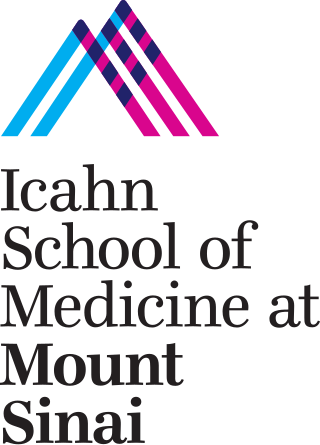
The Icahn School of Medicine at Mount Sinai, formerly the Mount Sinai School of Medicine, is a private medical school in New York City, New York, United States. The school is the academic teaching arm of the Mount Sinai Health System, which manages eight hospital campuses in the New York metropolitan area, including Mount Sinai Hospital and the New York Eye and Ear Infirmary.
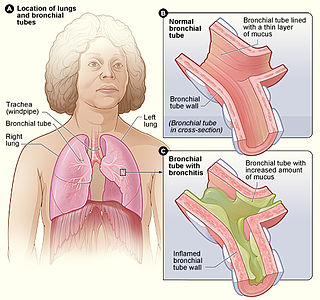
Bronchitis is inflammation of the bronchi in the lungs that causes coughing. Bronchitis usually begins as an infection in the nose, ears, throat, or sinuses. The infection then makes its way down to the bronchi. Symptoms include coughing up sputum, wheezing, shortness of breath, and chest pain. Bronchitis can be acute or chronic.

In medicine, exhaled nitric oxide (eNO) can be measured in a breath test for asthma and other respiratory conditions characterized by airway inflammation. Nitric oxide (NO) is a gaseous molecule produced by certain cell types in an inflammatory response. The fraction of exhaled NO (FENO) is a promising biomarker for the diagnosis, follow-up and as a guide to therapy in adults and children with asthma. The breath test has recently become available in many well-equipped hospitals in developed countries, although its exact role remains unclear.

Randall Bertram Griepp was an American cardiothoracic surgeon who collaborated with Norman Shumway in the development of the first successful heart transplant procedures in the U.S. He had an international reputation for contributions to the surgical treatment of aortic aneurysms and aortic dissection and in heart and lung transplantations. He received nearly $8 million in grants from the National Heart, Lung, and Blood Institute.

The Firestone Institute for Respiratory Health (FIRH) is a center for the investigation and treatment of respiratory diseases. Based out of St. Joseph's Healthcare in Hamilton, Ontario, Canada, the institute is a clinical facility with strong research directions. FIRH faculty are also heavily involved at McMaster University with education at the undergraduate, graduate, post-graduate and continuing medical education levels.
Joe G. N. "Skip" Garcia is an American pulmonary scientist, physician and academician.
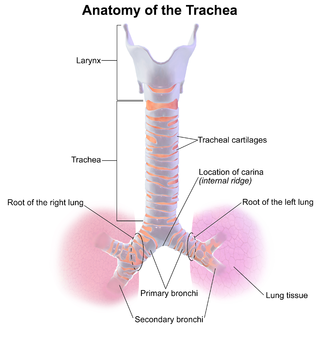
Tracheobronchomalacia (TBM) is a condition characterized by flaccidity of the tracheal support cartilage which leads to tracheal collapse. This condition can also affect the bronchi. There are two forms of this condition: primary TBM and secondary TBM. Primary TBM is congenital and starts as early as birth. It is mainly linked to genetic causes. Secondary TBM is acquired and starts in adulthood. It is mainly developed after an accident or chronic inflammation.

Sir Peter John Barnes, FRCP, FCCP, FMedSci, FRS is a British respiratory scientist and clinician, a specialist in the mechanisms and treatment of asthma and chronic obstructive pulmonary disease (COPD). He was Margaret Turner-Warwick Professor of Thoracic Medicine at the National Heart & Lung Institute, previous head of respiratory medicine at Imperial College and honorary consultant physician at the Royal Brompton Hospital London. He is one of the most highly cited scientists in the world
Ann Janet Woolcock AO FAA FRACP was an Australian respiratory physician–scientist and one of the world's leading asthma experts. She contributed greatly to the field of asthma research and founded the Institute of Respiratory Medicine, Sydney, which is now known as the Woolcock Institute of Medical Research.

Jason X.-J. Yuan is an American physician scientist whose research interests center on pulmonary vascular pathobiology and pulmonary hypertension. His current research is primarily focused on the pathogenic mechanisms of pulmonary vascular diseases and right heart failure.

Juanita L. Merchant is an American gastroenterologist and physiology researcher who has contributed to understanding of gastric response to chronic inflammation. She is currently the chief of the University of Arizona Division of Gastroenterology and Hepatology. Merchant was elected to the National Academy of Medicine in 2008, and appointed an inaugural member of the NIH Council of Councils.
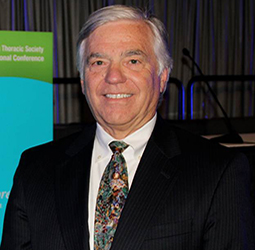
William N. Rom is the Sol and Judith Bergstein Professor of Medicine and Environmental Medicine, Emeritus at New York University School of Medicine and former Director of the Division of Pulmonary, Critical Care and Sleep Medicine at New York University and Chief of the Chest Service at Bellevue Hospital Center, 1989–2014. He is Research Scientist at the School of Global Public Health at New York University and Adjunct Professor at the NYU Robert F. Wagner Graduate School of Public Service. He teaches Climate Change and Global Public Health and Environmental Health in a Global World.

Denise Cai is an Assistant Professor of Neuroscience at the Icahn School of Medicine at Mount Sinai.
Sally Ellen Wenzel–Morganroth is an American pulmonologist. She is a professor and Rachel Carson Chair of Environmental Health at the University of Pittsburgh Graduate School of Public Health. Wenzel was formally the co-director of the Harry and Jeanette Weinberg Clinical Research Unit at National Jewish Medical and Research Center.
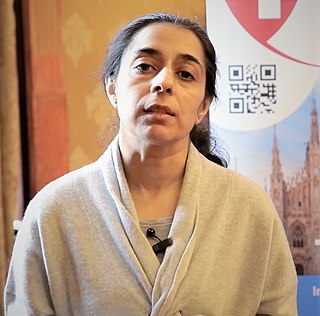
Sejal Saglani is a British medical researcher who is Professor and Head of the Inflammation, Repair and Development Section at the National Heart and Lung Institute. Her research considers wheeze and severe childhood asthma. She serves as an Honorary Consultant in Paediatric Respiratory Medicine at the Royal Brompton Hospital.

Jason C. Kovacic is an Australian-born cardiologist and physician-scientist; the Robert Graham Chair and Professor of Medicine, University of New South Wales; Executive Director of the Victor Chang Cardiac Research Institute in Sydney, Australia; and Professor of Medicine (Cardiology) at the Icahn School of Medicine at Mount Sinai, New York.
References
- ↑ Staff (24 October 2022). "Dr. Monica Kraft Discusses How Asthma Research is Helping Patients". Sea Isle News.
- ↑ "The Presidential Early Career Award for Scientists and Engineers (PECASE) Program Archive". grants.nih.gov.
- 1 2 Staff (25 October 2022). "Introducing Dr. Monica Kraft". OCNJ Daily.
- ↑ Staff (16 November 2022). "Monica Kraft Discusses Asthma Symptoms During Pregnancy". Downbeach.
- ↑ "$7 Million NIH Grant Aims at Helping Asthma Sufferers Better Control Attacks, Breathe Easier | Department of Medicine". deptmedicine.arizona.edu. August 11, 2016.
- ↑ Busse, William W.; Kraft, Monica; Rabe, Klaus F.; Deniz, Yamo; Rowe, Paul J.; Ruddy, Marcella; Castro, Mario (1 August 2021). "Understanding the key issues in the treatment of uncontrolled persistent asthma with type 2 inflammation". European Respiratory Journal. 58 (2). doi:10.1183/13993003.03393-2020. ISSN 0903-1936. PMC 8339540 . PMID 33542055.
- ↑ "Behind the bench... with Dr. Monica Kraft, Duke University". www.nhlbi.nih.gov. 28 October 2013.
- ↑ "Monica Kraft's research and publications". Researchgate.net.
- ↑ "Editorial Board: The American Journal of Medicine". www.amjmed.com.
- ↑ "The Presidential Early Career Award for Scientists and Engineers (PECASE) Program Archive". grants.nih.gov.
- ↑ "Dr. Monica Kraft Receives Distinguished Achievement Award from American Thoracic Society". deptmedicine.arizona.edu.
- ↑ "Elizabeth A. Rich, MD Award". www.thoracic.org.
- ↑ "Monica Kraft - Pulmonary Medicine (Lung) at Mount Sinai - New York". Mount Sinai Health System.
- ↑ Staff (26 September 2019). "Monica Kraft, MD, of the University of Arizona Named Arizona Bioscience Researcher of the Year". Business Wire.
This article needs additional or more specific categories .(December 2023) |